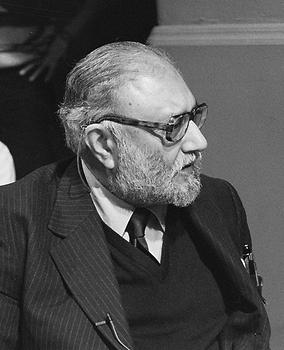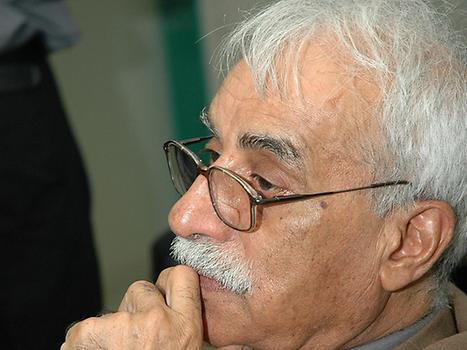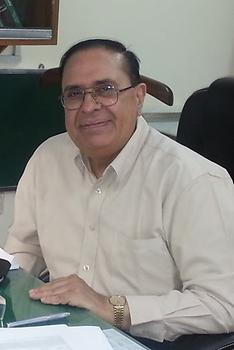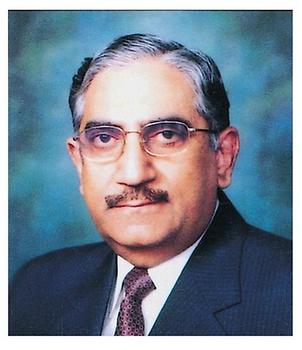Report on some top Pakistani scientists#
by Haris Naeem, August 2017Part of the information is taken from English Wikipedia.
Inhaltsverzeichnis
- Report on some top Pakistani scientists
- Introduction
- Dr. Abdul Salam
- Early Life and Education
- Scientific Career
- Dr. Abdul Qadeer Khan
- Early life and education
- Scientific Career
- Dr. Atta ur Rehman
- Early life and education
- Scientific Career
- Dr. Samar Mubarakmand
- Early life and education
- Scientific Career
- Abdullah Sadiq
- Early life and education
- Scientific Career
- References
Introduction#
In a country with over 200 million population, there are of course many of people who are famous in their respective fields. Some of the most prominent ones in the field of science and technology are discussed below.Dr. Abdul Salam#
Early Life and Education#

At that time, Indian civil service was highly valued. So his father wanted him to join it but Salam could not clear the medical tests. In 1946, Salam was awarded a scholarship at St. Stephens College, Cambridge where he completed a B.A degree in Double First Class Honours in Mathematics and Physics in the year 1949.
In 1950, he received the Smith's Prize from Cambridge University for the most outstanding pre-doctoral contribution to Physics. It was in 1951 that Salam obtained his PhD degree in theoretical physics from Cavendish Laboratory, Cambridge. His thesis was called "Developments in quantum theory of field" which contained a comprehensive study in quantum electrodynamics, QED. It gained him worldwide reputation and he was awarded by the Adams Prize from Cambridge University.
After returning to Pakistan in 1951, he served as a Professor of Mathematics in Government College University and University of the Punjab for three years.
He was very anxious to introduce a course on Quantum mechanics at undergraduate level and taught many students at university as well as private level. In 1954, he returned to Cambridge and took position as a Professor of Mathematics. In 1957, he was invited by the Imperial College, London where he helped to set up the Theoretical Physics Department. This department has a very high international reputation. The same year, Punjab University also awarded him an honourary degree for work in Particle Physics. Salam took a fellowship in Princeton University in 1959 where he met J. Robert Oppenheimer and worked with him on various problems in electrodynamics. He was the youngest member to be elected for Fellow of Royal Society(FRS), FRS
Scientific Career#
Salam had made a significant contribution to quantum electrodynamics and quantum field theory early in his career. In Pakistan, he dedicated himself to mathematics and its relation to particle physics. He encouraged people in Pakistan to do more research in theoretical physics.
He also worked on the theory of neutrinos- an elusive particle first postulated by Wolfgang Pauli in the early 1930s. He investigated elementary particles- protons and neutrons and proved several models mathematically along with his colleagues at Imperial College.
In 1972, Salam began to work with Indian scientist Jogesh Pati on the behaviour of protons and electrons which led to their discovery of Quarks and Leptons (of which protons and electrons are made of). The highlight of Salam's work was the study in unification of fundamental forces of nature which showed that weak nuclear forces are not different from electromagnetic forces and the two could inter-convert.
In 1967, Salam proved the electroweak unification theory Electroweak unification mathematically, and finally published the papers. For this achievement, Salam, Glashow and Weinberg were awarded the Nobel Prize in 1979.
Salam returned to Pakistan in 1960 to work with the Government. He became the science advisor to President Ayub Khan and the first technical member of Pakistan Atomic Energy Commission. On his advice, Pakistan's first national space agency was set up and he served as its first director.
He established high level research laboratories all over Pakistan and initiated Department of Physics in several universities to promote research in theoretical physics. He knew the importance of Nuclear technology in Pakistan and thus led to the establishment of Pakistan Institute of Nuclear Science and Technology in 1965 and first Nuclear Power Plant in Karachi Karachi in 1970.
His efforts were dedicated to promote Nuclear technology for peaceful and healthy purposes for which he received the Atoms of Peace award. Abdul Salam was called in by Zulfiqar Ali Bhutto in 1971 to work on Pakistan's nuclear project. For this, he travelled to United States for information about the Manhattan project and was given an office in Prime Minister's secretariat under the order of Bhutto, who was determined to build the atomic bomb for Pakistan after India had done so. Abdul Salam was a Ahmadi and when Ahmadis were declared non Muslims in 1974. He left the country. His relations with Bhutto deteriorated. He lodged a powerful protest against him for his actions against Ahmaddiya community.
In spite of this, Salam maintained close relations with scientific community in Pakistan and invited around 500 students from Pakistan, for higher studies during his stay abroad.
He founded the International Centre for Theoretical Physics (ICTP), ICTP in Italy where he invited many Pakistanis. In 1981, he became a founding member of World Cultural Council.
He died peacefully at the age of 70 in Oxford, England. His body was brought to Pakistan and was buried in Bahishti Maqbara, a cemetery established by Ahmadiyya community. He is the first Muslim Nobel Laureate and the father of Pakistan's school of Theoretical Physics. His lifelong research, teachings and institutions are still very important for the country.
Dr. Abdul Qadeer Khan#
Early life and education#
Dr. Adbul Qadeer Khan (born 1 Apr. 1936), known as Khan for short, is a Pakistani nuclear physicist and metallurgical engineer, who founded the uranium enrichment program for Pakistan's atomic bomb project. He was born in Bhopal, British India Bhopal, India and moved to Pakistan in 1952. He enrolled in Karachi University in 1956 to study physics from where he graduated in 1960.
In 1961, he went to Germany to study metallurgy, Metallurgy|https://en.wikipedia.org/wiki/Metallurgy] at the Technical University, Berlin transferred to Delft University of Technology, Netherlands in 1965. There he completed his MS degree in engineering and joined the Catholic University of Leuven for doctoral studies. Here he received his PhD in metallurgical engineering in 1972. His doctoral thesis included fundamental work on marten site and its extended industrial applications to the field of morphology.
Scientific Career#
After his doctoral degree, he went to work in Physics Dynamic Research Laboratory in Amsterdam where his studies were on high strength materials used in centrifuges. He performed various experiments on uranium metallurgy including enrichment on uranium which was an extremely difficult physical process. His pioneering research in the improvement of Zippe method, Zippe method was highly valued by the firm of Urenco, Urenco.
In 1972, Zulfiqar Ali Bhutto approved a crash program to develop an atomic bomb after a meeting held in Multan. Following India's nuclear bomb tests in 1974, Bhutto wanted to accelerate the project. After learning about these developments, Khan approached Pakistani Government officials to offer his services. Initially, he was turned down because there were no jobs for metallurgists.
However, on the request of Bhutto, detailed inquires were made regarding Khan's education and scientific career. The result was that Bhutto held a meeting with him in which Khan highlighted the importance of using uranium instead of plutonium for the development of the atomic bomb. Though not initially convinced, Bhutto saw sense in the scientist's remarks. Therefore Khan was officially enrolled in the Atomic bomb program by becoming a member of the enrichment division at Pakistan Atomic Energy Commission(PAEC), PAEC in 1975.
However he and other scientists were divided over the use of plutonium or uranium which caused some tension between Khan and Munir Ahmed, then chairman of PAEC. Therefore, Khan was given a separate research laboratory in the remote area of Kahuta Kahuta, Pakistan where he worked with Army's Corps of Engineers. Though he was later appointed director of Research Laboratory, he was never in charge of the actual development of atomic bombs, mathematical and physics calculations, and eventual weapons testing.
His colleagues considered him to be a showman when it came to his work. A strong rivalry developed between him and Munir Ahmed.
Eventually, on 28th May, 1998, Pakistan's first nuclear tests were conducted in Chagi, Balochistan Chagi, Balochistan and two days later, a plutonium nuclear device was detonated as well, under the leadership of Samar Mubarkband. Khan was a major driving force behind the grant of permission of these tests by Prime Minister Nawaz Sharif. However, many of Khan's colleagues were irritated that he seemed to enjoy taking full credit for something he had only a small part in.
In January 2004, the Pakistani government summoned Khan for a debriefing on his active role in nuclear weapons technology proliferation in other countries after the United States provided its proof to the Pakistanis. Khan formally admitted his responsibility for these activities a month later. He was put under house arrest for many years until the Islamabad High Court declared Khan to be a free citizen in 2009.
Although Khan faced heated criticism from his colleagues due to his attitude of being the 'father of atomic bomb in Pakistan’. Yet he is seen as a national hero of the country by many people today. His work on condensed physics and his rigorous stance on the use of controversial technological solutions to many military and civilian problems is hailed by lots of people in the country. Khan has rendered his services to many of the country’s educational institutions in the recent years.
Dr. Atta ur Rehman#
Early life and education#
Dr. Atta ur Rehman (born 22 Sept. 1942), known as Rehman for short, is a Pakistani scientist specializing in organic chemistry. He was born in Delhi (British India) Delhi to an Urdu-speaking family having a good academic background. His grandfather, Sir Abdur Rahman, was a vice-chancellor of the University of Delhi (1934–38) and then appointed to the same post in Punjab University in 1946.Rehman attended Karachi University to obtain a bachelor's degree in Chemistry in the year 1964. He did his MSc in organic chemistry in 1965 and earned a Commonwealth Scholarship for his doctoral studies in Cambridge University. There, he completed his PhD in organic chemistry in 1968. His thesis was based on fundamental work on natural products and organic materials. In 1987, Cambridge University also awarded him with the Doctor of Science (Sc.D.) degree for his contribution for the advancement of the chemical sciences. In 2007, Coventry University bestowed him with the Doctor of Education (Ed.D.) in recognition of his services to help improve science education in Pakistan.
Scientific Career#
Rehman has served Karachi University as a Professor of Chemistry and later as a Director of Chemistry Research Institute till 1990. With more than 1052 international publications, including 210 books and 37 international patents, he has the distinction of being the only scientist to be elected Fellow of Royal Society (London) in 2006 in recognition of research contributions carried out within a country in the Islamic world.He is also the only scientist from the Muslim world to have been awarded the UNESCO Science Prize (1999). He was awarded an Honorary Life Fellowship by King's College, University of Cambridge in 2007, an honorary Doctorate of Science by Cambridge University 1987, a Doctorate of Education by Coventry University in 2007, a Doctorate of Science by Bradford University in 2010, a Doctor of Philosophy by Asian Institute of Technology, Thailand in 2010 and honorary Doctor of Science by University of Technology MARA. Malaysia.
Many other universities have awarded him also honorary doctorates. The highlight of Rehman's career is his era in Higher Education Commission (HEC), HEC.
His reforms in the institution have been acclaimed internationally. Since 2002, it was estimated that almost 4000 scholars have participated in PhD programs in Pakistan out of which 600 completed their degree at foreign universities. The HEC instituted major upgrades for scientific laboratories, rehabilitating existing educational facilities, expanding the research support, and overseeing the development of one of the best digital libraries in the region.
Rehman has won four international awards for the revolutionary changes in the higher education sector brought in the HEC. The Austrian government conferred its highest civil award (“Grosse Goldene Ehrenzeichen am Bande") in recognition of his eminent contributions. This shows that his contributions to education sector in Pakistan are very substantial.
He has assisted Pakistani Government on various fronts as a Minister for Science and Technology (2000-2002) and as director of Scientific and Technological Cooperation of Pakistan. Rehman is the most honoured scientist in the country receiving four civil awards from successive governments including highest national civil award. 'Nishan e Imtiaz'.
He has currently established a research center on Genomics research at the University of Karachi. He writes articles on "The News" regarding Science and Technology and is an active promoter of biological research in the country.
Dr. Samar Mubarakmand #
Early life and education#
Dr. Samar Mubarakmand (born 17 Sept. 1942), known as Samar for short, is a Pakistani nuclear physicist and a key figure in the country's nuclear bomb tests. He was born in Rawalpindi to a Punjabi family. He matriculated from St. Anthony's High school, Lahore in 1956 and enrolled at Government College University to obtain a degree in Physics. After his graduation in 1960, he worked on experimental physics under his professor Dr. Tahir Hussain. His thesis contained work on gamma ray spectrometer which was highly praised by an Oxford professor who was visiting Pakistan at that time.
Professor Denys Haigh Wilkinson of Oxford University invited Samar to England. In 1962, Samar joined Pakistan Atomic Energy Commission and received a scholarship to study at Oxford University. Therefore, he joined the prestigious institute and worked with Dr. Denys Wilkinson in the development of 22 million volt atomic accelerator.
It was in Oxford that he learnt about linear accelerators which he then built in Pakistan after his return. He joined Atomic Energy Commission and served Government College University as a visiting assistant professor of Physics.
Scientific Career#
Upon returning to Pakistan, Samar did his post doctoral research in Institute of Nuclear Science and Technology (PINSTECH), PINSTECH. He joined the Nuclear Physics Group with his colleagues and worked in Chemical Engineering, specifically studying methods involving gas centrifuges.After the 1974 atomic bomb tests of India, preparations for Pakistan's nuclear bomb were accelerated. A Fast Nuclear Physics Group (FNPG) was established under PAEC on advice of Dr. Abdul Salam. Samar was given charge as its first director. The FNPG generated work calculating the neutron temperature, initiator, and helping designing the neutron reflector. In 1978, Samar built a linear particle accelerator at the PINSTECH to conclude solutions concerning the neutron generator.
Due to his extensive experience in experimental Physics, he was appointed Director of Diagnostics Group, a secret division of PAEC that conducts experimental tests of atomic bombs. He was also made the Director of Technical Development (DTD) which developed explosive lenses and triggering mechanism for nuclear weapon.
He first visited Chagi Hills in 1981 with Dr. Ishfaq Ahmed where the atomic tests were to be conducted. He worked day and night in the preparations of the tests and kept briefing Prime Minister Nawaz Sharif of the developments. It was on 28 May, 1998 that Samar finally led the countdown of Pakistan's first atomic bomb tests in Chagi, Balochistan Chagi, Balochistan . Two days later, a plutonium fission weapon was also tested at the same place.
Samar took strong initiatives to develop Pakistan's space program. He led the team of engineers who successfully completed the Shaheen program (a supersonic ballistic missile experiment) in 1999. He has been part of Pakistan's Planning Commission where he has strongly advocated expanding the space program. In 2009, he revealed work on Pakistan's first geo startionary satellite which was eventually launched in 2011.
From 2013, he is assisting Balochistan Government in the extraction of coal under the Thar Coal project. For his services, he has received many civil awards including the country's highest award, Nishan e Imtiaz. Samar remains a key figure in scientific research and is no doubt, a valuable asset to the country.
Abdullah Sadiq#
Early life and education#

Abdullah Sadiq (born 1940), known as Sadiq for short, is a Pakistani physicist and an International Centre for Theoretical Physics (ICTP) laureate. He was born in Peshawar Peshawar and did his schooling from Islamia Collegiate School.
He joined Islamia College Peshawar for his undergraduate studies where he obtained a B.Sc in physics in the year 1962. In 1967, Sadiq joined Peshawar University where he got his M.Sc in physics as well. His mentor, Abdul Majid Khan advised him to study further in the United States. This proved to be good advice. He was able to enroll at University of Illinois at Urbana Champaign where he got his PhD in Condensed Matter Physics in the year 1971. Sadiq also served as a guest lecturer in ICTP.
Scientific Career#
After returning to Pakistan, Sadiq joined the Pakistan Atomic Energy Commission where he worked at Nuclear Physics Division at PINSTECH department. His field of research was laser, optical and particle physics. He had also worked at neutron particle accelerator as a chief scientist.Sadiq was very inspired by Abdul Salam and his seniors at PAEC, Munir Ahmed and Ishfaq who according to him, helped to write his doctoral thesis. Sadiq's research extends to electron microscopes, X-rays, crystal growth equipment and Auger spectroscopy.
After retiring from PAEC, he has been serving many universities of Pakistan as a professor of high energy physics. Currently, he is the professor and Dean of Department of Physics at Air University, Islamabad Islamabad .
He has contributed to many Physics Journals which are well recognized by scientists worldwide. Sadiq is the recipient of country's 3rd highest civilian award, Sitar e Imtiaz and remains a prominent figure in Nuclear Science.
References#
- Abdul Salam
- Abdul Salam and his International Influences
- Abdul Qadeer Khan
- Samar Mubarakmand
- Atta ur Rehman
- Abdullah Sadiq

